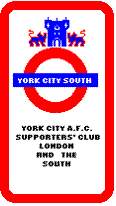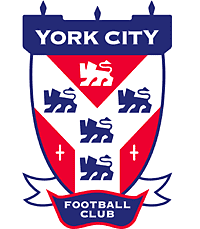



|
YORK CITY SOUTH |
City History
2000/1 Accounts
THE YORK City accounts for the year ending June 30, 2001 have been published and do not make pleasant reading for anyone connected with the club. The bottom line loss in the year 2000-01 amounts to £1.26 million.
Although income rose from £1.2 million to £1.4 million, costs also rose from £2.2 million to £2.7 million. Payroll costs increased from just over £1.65 million to a shade over £2.16 million, which is more than the overall income of the club, of £1.4 million (before transfer fees). This is irrespective of other costs, which are incurred including playing expenses (travel etc), depreciation, purchase of shop stock and printing, which brought the total costs of the club up to over £2.75 million.
The rise in income can partly be attributed to the use of Bootham Crescent by Leeds United reserves, the Manchester United friendly and the FA Cup ties at Reading and Leicester City. Gate receipts and commercial activities showed no significant change.
The increase in expenditure can be virtually solely attributed to the rise in the wage bill. Overall costs rose by just over £500,000 as did the wage bill. Most other costs, including playing expenses, rates, utilities (light, heat, telephone), remained relatively static. There were anomalies, but these tended to offset each other. For instance there was an increase in Policing and Stewarding costs but these were off set by a reduction in the cost of pitch maintainance. This reduction was due to the fact that in the previous year, some major drainage work had taken place at the training ground.
The operating loss would have been greater if it had not been for a small surplus in the transfer market, in particular receipts for appearances made at Manchester United by Jonathan Greening. The money received for Greening has to be offset by the write-off of costs incurred in bringing players into the club, in this and previous seasons. Once all these player movements had been taken into account, the net loss was £1.26 million.
It is clear that these losses are unsustainable and steps need to be taken, primarily in cutting the costs to help ensure the survival of the football club.
The York City chairman, Douglas Craig explained the situation, in his report to the shareholders, "Though the results of the 2000-01 football season were disappointing for the club, we made considerable progress in rebuilding a squad capable of bringing long term success. After taking over as manager late in the previous season, when the club was in serious threat of relegation, Terry Dolan faced the 2000-01 season with a large squad of players signed by his predecessors and this presented him with three challenges:
1. Ensuring the club did not risk relegation while he rebuilt the playing squad
2. Reducing the players’ wages bill to levels that the club’s operating budget could sustain
3. Recruiting or developing young players with the capability of not just taking the club into the Nationwide Second Division but able to sustain the club’s performance at a higher level.
While the club had some uneasy moments in the second half of the season, Terry steered the first team to a safe position while reducing the size of the playing squad. More significantly he managed the transition from a large squad of players whose average age was almost 30 to a small squad whose average age is now 24," explained Craig.
It is clear therefore that one of the prime reasons for the increased costs at the club and the subsequent increase in the shortfall was down to the large squad, including a number of senior professionals, who obviously command higher wages. The aim for the current year is to have the wage bill reduced back down to more manageable levels, and the reduction of the size and the average age of the squad. This should be achieved now that some of the senior professionals, including the likes of Fairclough, Swan, Agnew, Skinner, Hulme, Sertori and Alcide, are no longer on the books. The chairman continued, "As the accompanying accounts show, the expenditure incurred by the club is not covered by income from normal trading activities. It relies heavily on income earned from the sale of players developed by the club, an activity that has delivered more than satisfactory results in recent years. This income was hampered during the season under review by doubts cast by European bureaucrats and few clubs were willing to pay transfer fees, particularly for players from the lower divisions, until the situation was clarified." In early 1999, Craig dismissed a claim that Agnew was on £2,500 per week, he stated, "I am not prepared to discuss the individual contracts of individual players but the range is something like £150 to around £1,700 or £1,800 (a week)." £1,800 for Agnew was a figure I'd always remembered, but others have quoted £2,500.
Looking to the future, none of these figures take into account anything which has happened since June 30, 2001 and there is more encouraging news since then. Further money has been received from the sale of Greening from Manchester United to Middlesbrough, as well as youngster Chris Hogg from City’s under-16 side to Ipswich Town. The wage bill has been reduced, but attendances are still not enough to cover the clubs’ expenditure. On gates of 3,000, the club cannot balance the books and are forced to find other means, such as the sale of players, to help fund the shortfall.